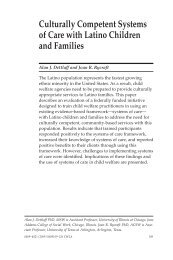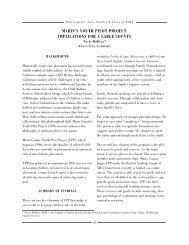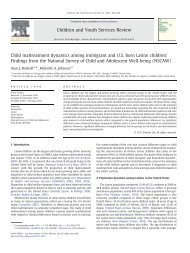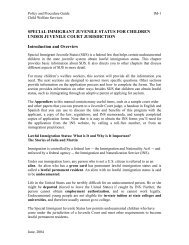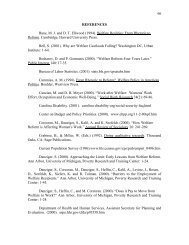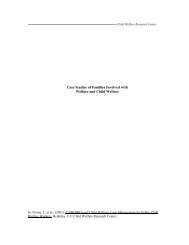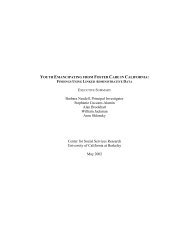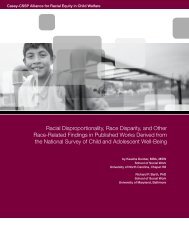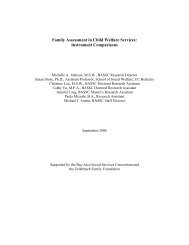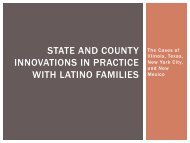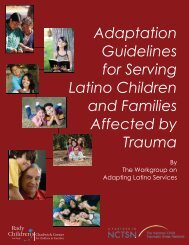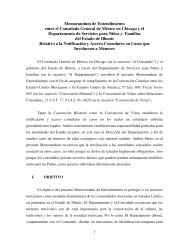Developing a Self-Assessment Toolfor Culturally - Office of Minority ...
Developing a Self-Assessment Toolfor Culturally - Office of Minority ...
Developing a Self-Assessment Toolfor Culturally - Office of Minority ...
Create successful ePaper yourself
Turn your PDF publications into a flip-book with our unique Google optimized e-Paper software.
COSMOS Corporation, October 2003 2-7StudyCross, et al., “Towards a <strong>Culturally</strong> CompetentSystem <strong>of</strong> Care: A Monograph on EffectiveServices for <strong>Minority</strong> Children Who are SeverelyEmotionally Disturbed,” 1989Adams, ed., Health Issues for Women <strong>of</strong> Color: ACultural Diversity Perspective, 1995Campinha-Bacote, “The Process <strong>of</strong> CulturalCompetence,” State <strong>of</strong> Washington, Department<strong>of</strong> Health, 1995Orlandi, ed., Cultural Competence for Evaluators:A Guide for Alcohol and Other Drug AbusePrevention Practitioners Working WithEthnic/Racial Communities, 1995Association <strong>of</strong> Asian Pacific Community HealthOrganizations, State Medicaid Managed Care:Requirements for Linguistically Appropriate HealthCare, 1996Lavizzo-Mourey and Mackenzie, “CulturalCompetence: Essential Measurements <strong>of</strong> Qualityfor Managed Care Organizations,” 1996National Maternal and Child Health ResourceCenter on Cultural Competency, Journey TowardsCultural Competency: Lessons Learned, 1996Tirado, Tools for Monitoring Cultural Competencein Health Care, 1996Andrulis, “Toward a More <strong>Culturally</strong> CompetentSystem <strong>of</strong> Care: Implications for Federal Policy,Managed Care Provider and Communities,” 1997McManus, ed., “Services to <strong>Minority</strong> Populations:Cross-cultural Competence Continuum,” 1998Source: CLAS in MCOs Study (OMH 2003b)Exhibit 2-1SELECT DEFINITIONS OF CULTURAL COMPETENCEAND CULTURALLY APPROPRIATE HEALTH CARE SERVICESDefinitionCultural competence: Organizations have formal policies, such as mission statements, specifically expressing acommitment to cultural diversity.Cultural competence: Cultural or ethnic competence refers to the development <strong>of</strong> skills that will help people behavein a culturally appropriate way with a given group, demonstrating both sensitivity to cultural differences and similaritiesin the effective use <strong>of</strong> cultural symbols in interactions and effective communications with members <strong>of</strong> diversepopulations. (The definition continues.)Cultural competency: “a set <strong>of</strong> behaviors, attitudes and policies <strong>of</strong> a system, agency or individual that enables thatsystem, agency or individual to function effectively in trans-cultural interactions...and a person’s or programs’s abilityto honor and respect the cultural differences (beliefs, interpersonal styles, attitudes and behaviors) <strong>of</strong> individuals andfamilies who are clients, staff administering programs, and staff providing service at state and local levels. In doingso, it incorporates values at the levels <strong>of</strong> policy, administration, and practice.”Cultural competence: a set <strong>of</strong> academic and interpersonal skills that allow individuals to increase theirunderstanding and appreciation <strong>of</strong> cultural differences and similarities within, among, and between groups. Thisrequires a willingness and ability to draw on community-based values, traditions, and customs, and to work withfocused interventions, communications, and other supports.<strong>Culturally</strong> appropriate services: “effectively identify the health practices and behaviors <strong>of</strong> target populations todesign programs, interventions, and services which effectively address cultural language barriers to the delivery <strong>of</strong>appropriate and necessary health care services.”Cultural competence: the integration <strong>of</strong> 1) health-related beliefs and cultural values; 2) epidemiology; and 3)treatment efficacyCultural competency: “a program’s ability to honor and respect beliefs, interpersonal styles, attitudes, and behaviors<strong>of</strong> families who are clients, as well as the multicultural staff who are providing services. It incorporates these values atlevels <strong>of</strong> policy, administration, and practice.” Cultural competency is viewed as a continuum, not as a one-time goal.“Competency implies skills which helps to translate beliefs, attitudes, and orientation in action and behavior in the dailyinteraction with children and families.”Cultural competency: level <strong>of</strong> knowledge-based skills required to provide effective clinical care to patients from aparticular racial or ethnic groupCultural competency: “effectively incorporating the ethnic/cultural characteristics <strong>of</strong> individuals and their health careneeds and in promoting health, and working to achieve the highest quality care.”Cross-cultural competency: “the knowledge and interpersonal skills that allow providers to understand, appreciate,and work with individuals from cultures other than their own. It involves an awareness and acceptance <strong>of</strong> culturaldifferences, self-awareness, knowledge <strong>of</strong> the patient’s culture, and adaptation <strong>of</strong> skills.”



